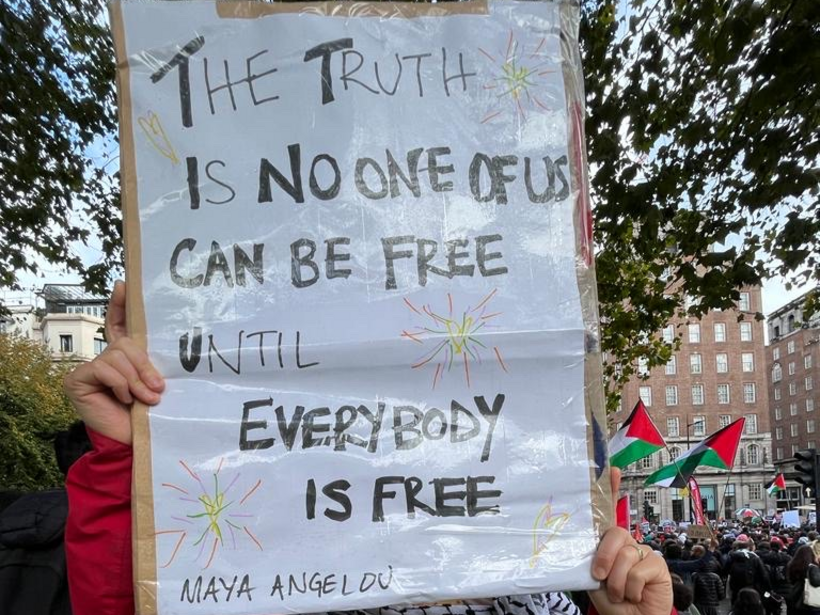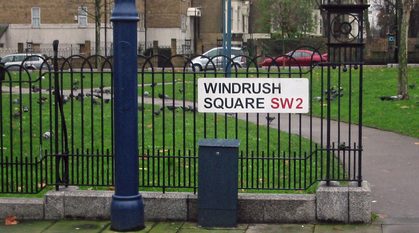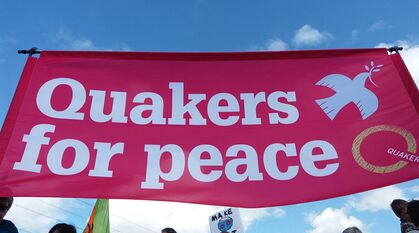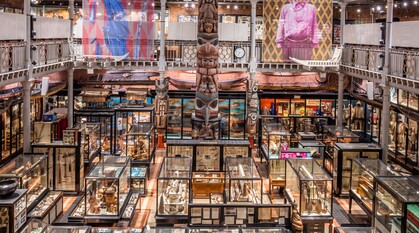Why does taking action for just peace in Palestine and Israel support our work for climate justice?
There will be no climate justice if we fail to protect everyone's basic human rights and work towards equality, argues Rebecca WalkerWoo.

On 19 June this year, the UK Government tabled a bill that infringes on our right to use boycott and divestment as peaceful means of protest. The 'Economic Activity of Public Bodies (Overseas Matters) Bill' (or 'Anti-boycott bill') aims to prevent public bodies (such as local authorities, universities, some pension funds and other public institutions like the National Health Service) from making financial decisions based on ethical choices.
This matters in the context of a just peace in Palestine and Israel because we know that when there is an imbalance of military and financial power, outside pressure is needed to challenge abuses of power and to bring about equality and justice for all.
A power imbalance of this nature characterised the apartheid regime in South Africa and in the words of Lord Hughes (a former Labour MP and the Chairman of the Anti-Apartheid Movement) "Boycotting was a very effective propaganda tool". Throughout the 1960s to 1980s, over 120 local councils in the UK engaged in some form of anti-apartheid protest, with boycotts helping to lead the apartheid regime in South Africa to its downfall.
But the bill isn't just about the conflict in Palestine and Israel, it could also touch on our work for climate justice. In 2013, as a national church, Quakers agreed to divest from fossil fuel companies. However, this bill could interfere with efforts to divest from harmful activities like deforestation and fossil fuel extraction. It only carves out exemptions in the case of illegal environmental damage, whereas much damage around the world occurs within national legal frameworks.
Can we win?
The bill has already passed through the earlier stages of law making in the House of Commons and will shortly reach its Third Reading before consideration by the House of Lords. Campaigning will not be without its challenges – the Bill was part of the Conservative party manifesto. As such, it may be protected by the Salisbury convention (a constitutional convention in the UK that means that Lords will generally not try to vote down a UK Government bill mentioned in an election manifesto).
But just because a campaign is challenging doesn't mean we should give up. Hundreds of thousands of people have been taking to the streets week after week in the UK alone to call for a ceasefire and to protest against the collective punishment of an entire population in Gaza and the West Bank for the actions of a few.
We have seen solidarity actions from Jewish campaigners saying not in their name, LGBT activists subverting advertising boards to stand with queer communities in Palestine, direct action groups who focus on domestic violence coordinating acts of civil disobedience occupying train stations. The solidarity across social justice movements has been powerful and necessary. And it is this collective resistance which lets people in Palestine and Israel know we have not forgotten them, and which holds our politicians accountable.
Why taking action for a just peace is part of being a climate justice activist
At Quakers in Britain, we work towards building a peaceful and sustainable world. That's why I was drawn to working here – we cannot build that world unless we transform our ways of relating to one another and to the planet. And our response to climate breakdown cannot be separated from making sure we address the root causes of violence and inequality around the world.
[QUOTE-START]
I think that is what justice is to me, to be able to have equal access to natural resources, to your land, to your trees, to harvest it, to irrigate it, to not worry about the basics in your life. (…) And to have equality.
- Yara Hasan, 'Planting seeds of hope in occupied territories' – Storytelling from the Frontlines
[QUOTE-END]
On a personal level, I believe in a better world. And I fiercely tend to my hope and fire that keeps me working for that world to materialise one day. That's why, as a climate justice activist, I've taken my son to Parents 4 Palestine actions, I've marched at the national demos, I've written to my MP calling for a ceasefire and the release of hostages, I've shared information and resources through my social media account and I've seen a just peace in Palestine and Israel as integral to the peaceful and sustainable world we want to build.
What can we do?
What can we as climate justice activists do? Join our opposition of the Anti-boycott bill! We're part of a coalition of over 70 civil society organisations, from Friends of the Earth and Greenpeace to Unite the Union, UNISON, the Palestine Solidarity Campaign and Na'amod: UK Jews Against the Occupation, all collectively opposing the bill. What unites us is a belief that the bill will stifle a wide range of campaigns, threatening our freedom of expression, as well as the ability of public bodies and democratic institutions to use their money ethically, in line with international law and human rights. As the anti-boycott bill enters the House of Lords, we will need as many voices as possible to speak up against it.
Apart from opposing the bill, you can delve into our climate justice year of learning resources, particularly Solidarity in social justice (PDF). Our colleagues in the Ecumenical Accompaniment Programme in Palestine and Israel have also shared 5 solidarity actions you can take for Palestine and Israel. I cannot recommend their resource highly enough – it is packed full of information to help you understand the context to the escalation in violence: 55 years of Israeli military occupation of Palestinian land and 75 years of dispossession and oppression of the Palestinian people. And it includes a number of actions you can take. Please read it.
Take action for climate justice and a just peace. And don't forget to share what you're doing (and why) far and wide!


